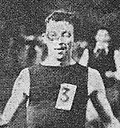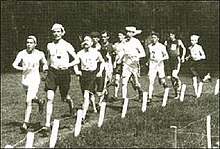Michel Théato
| athletics | ||
| gold | 1900 | marathon |
Michel Théato ( Michel Johann Théato ; born March 22, 1878 in Luxembourg , † probably 1919 in Paris ) was a Luxembourgish long-distance runner . At the Olympic Games in Paris in 1900 , he was Olympic champion in the marathon .
biography
A number of rumors and anecdotes surround Michel Théato, which persist to the present day and even led to Théato being erroneously listed as French in the winners' lists of the International Olympic Committee (IOC) .
Finding his birth certificate clearly shows that Michel Théato was born in Luxembourg as the son of Johann Théato and Marie-Anne Wirz. The origin of the Théato family lay in the Palatinate . In 1722 she emigrated to Luxembourg. Michel's father moved with his family to Brussels in 1883 , where the young Théato learned the trade of cabinet maker. Soon afterwards he went to Paris . However, he was definitely too young to accept French citizenship, so that when he won the Olympics in 1900 he could not have had French citizenship.
Théato was a member of the Club amical et sportif de Saint-Mandé and started as a completely unknown runner in the 1900 Olympic marathon in Paris , although a year earlier he had finished fourth in a 15 km run, the Prix Gondrand . The French Georges Touquet-Taunis and Émile Champion were favored for a win . Spectators and experts wondered who the young runner was who was still running alongside the favorite champion just a few kilometers from the finish and then pulled away from him to cross the finish line as the winner in the first marathon of his life. Théato completed the route with a length of exactly 40.26 km in 2:59:45 hours.
After the victory, his club and all of France boasted of himself, so it was not surprising that his origins were not traced any further.
The run drew numerous protests. The Swede Ernst Fast complained that he was allegedly deliberately misdirected by a police officer and only sent back on the right path by astonished passers-by, but that he had to accept an unrecoverable backlog. The fifth, the American Arthur Newton , claimed for years that the French runners had shortened because of their knowledge of the route, because after all, he had taken the lead halfway through the race and would not have been overtaken by anyone afterwards. Dick Grant , Newton's compatriot and sixth in the run, even sued the organizers and led a year-long trial without result.
The Olympic marathon in Paris has a flaw to this day. This is reinforced by the IOC by the fact that the knowledge about the true nationality of the winner, Michel Théato, has not yet been taken into account in their published lists of winners and in the table of medals .
It is also impossible to get rid of a rumor that Théato was a baker's boy who got his stamina when delivering the rolls and who got through the heat during the marathon because he was used to it from the bakery. His victory was surprising and inexplicable for many observers, understandably this simple reason was used.
The placements at the Olympic Games for Michel Théato:
- II. Olympic Games 1900, Paris
- Marathon - gold with 2:59:45 h (silver to Émile Champion from France with 3:04:17 h; bronze to Ernst Fast from Sweden with 3:37:14 h)
For several decades there was no idea who this runner named Théato was. The few existing photos from that time were difficult to interpret. One of these photos shows a runner in a striped jersey with the number 63 being sprayed with a water syringe by a marshal. It was the only known photo of the Olympic marathon for a long time, so it was believed to portray the winner. In fact, the photo was taken at the race of the professionals from Paris to Conflans eleven days earlier . So this is not about Théato.
The renowned French athletics club Racing Club de France became Théato's new sporting home. On October 13, 1901, he completed his second marathon in Lyon , where he finished third with 2: 42: 43.4 hours. Then he tried his hand at being a professional . In 1902 he took part in the 41.2 km Achères-Paris run , where he was only ninth with 3:18:30 h. A short time later, knee problems forced him to end his career as a runner. The Olympic victory was still fondly remembered, so that his association employed him as a gardener in the Bois de Boulogne . In 1912 he received a gold medal retrospectively for his Olympic victory. He spent the time of the First World War as an art carpenter. Increasingly he had alcohol problems.
He spent the last years of his life in a home, although it is unclear whether it was an insane asylum, as can be read in some publications, and where this home was located. The year of his death is also not known with certainty. So it cannot be ruled out that Théato did not die until 1923.
literature
- Volker Kluge : Summer Olympic Games. The Chronicle I. Athens 1896 - Berlin 1936. Sportverlag Berlin, Berlin 1997, ISBN 3-328-00715-6 .
- Walter Mallmann : Olympic marathon. Sport und Medien Verlag 1993, ISBN 3-9803182-4-9 .
Web links
- Article about the 1900 Olympic marathon (French)
- Michel Théato in the Sports-Reference database (English; archived from the original )
Footnotes
- ↑ a b There was no award of the first three places in their current form with gold, silver and bronze medals in 1900. In some sports and competitions, silver or bronze plaques were awarded.
| personal data | |
|---|---|
| SURNAME | Théato, Michel |
| ALTERNATIVE NAMES | Théato, Michel Johann (full name) |
| BRIEF DESCRIPTION | Luxembourg marathon runner |
| DATE OF BIRTH | March 22, 1878 |
| PLACE OF BIRTH | Luxembourg |
| DATE OF DEATH | uncertain: 1919 |
| Place of death | Paris |

